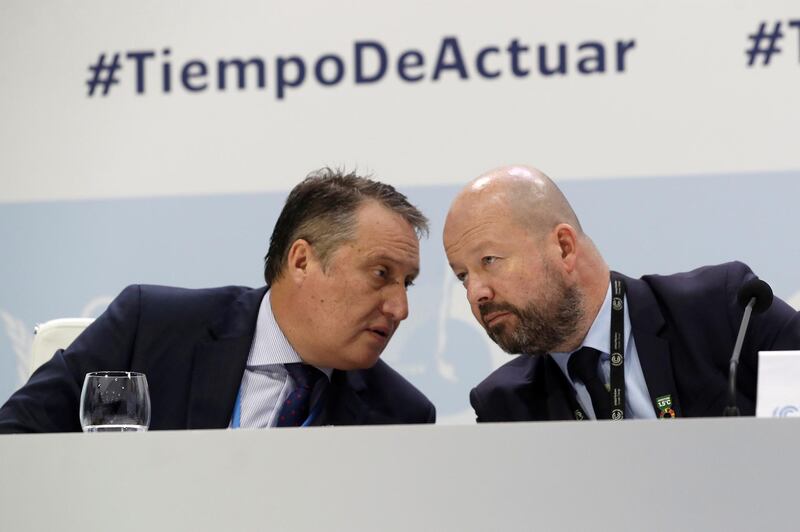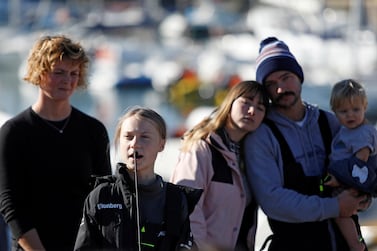UN climate talks in Madrid dragged into a second day of extra time on Sunday, with officials from almost 200 countries unable to break the deadlock on key points of difference.
The chair of the meeting, Chilean Environment Minister Carolina Schmidt, told weary delegates to examine new agreements drafted by her team and meet again in the early hours of Sunday morning for further talks.
“This has been very tough, very long,” she said as the talks entered their 14th day. Ms Schmidt said some progress had been made, adding that “things are coming together.”
Developing countries and environmental groups warned that the drafts circulated overnight on Saturday risked undoing or stalling on commitments made in the 2015 Paris climate accord.
“I’ve been attending these climate negotiations since they first started in 1991, but never have I seen the almost total disconnection we’ve seen here … in Madrid between what the science requires and the people of the world demand, and what the climate negotiators are delivering,” said Alden Meyer, a climate policy special at the Union of Concerned Scientists.
Mr Meyer said the current drafts didn’t reflect urgent warnings from scientists that greenhouse gas emissions need to fall sharply, and soon.
“The planet is on fire and our window of escape is getting harder and harder to reach the longer we fail to act,” Mr Meyer said.
Speaking at an earlier press conference at the summit, which has been running since Monday, co-ordinator at the COP25 Presidency Andres Landerretche said he hoped work would conclude "today or probably early in the night".
Asked whether the talks might be suspended, as was the case in 2000 with COP6, Mr Landerretche said organisers did not envisage the need for a suspension.
📡Live from Madrid: The #COP25 Presidency briefs the media on the state of the negotiations. #TimeForAction https://t.co/TmwzPc5EXU
— UN Climate Change (@UNFCCC) December 14, 2019
Among the main issues still being discussed in Madrid are rules for international carbon markets and a system for channelling money to help poor countries cope with the economic impact of climate change.
Among the countries pushing back against new measures to help poor countries and set new emissions targets was the United States
"I've just heard the comments of many others here today on the need to include an expansive additional language on gaps and needs," said Kimberly Carnahan, a State Department official representing the United States at the talks.
"We don't support such language and we would not think that it would lead to the balance of this text, but rather take us quite far in the other direction," she said.
Nathaniel Keohane, of the Environmental Defence Fund, said it was critical for countries to resist attempts by Brazil and others to keep large piles of carbon credits amassed under a now-discredited system.
“That opens up a potentially major hole in the fabric of the Paris Agreement,” he said.
“There is really a question of integrity at stake and it is really critical for countries to hold the line.”
Ms Schmidt told negotiators shortly after midnight that citizens around the world expected results to help tackle the “climate crisis” from the talks in the Spanish capital.
Growing concern about climate change has been reflected in mass protests staged around the world over the past year, often by young activists concerned about the future they and their children might face as the planet heats up.
The ambition and scale of the changes made at the talks has also been under the spotlight.
Demonstrations took place inside and outside the venue of the talks in the Spanish capital, with Swedish teenage activist Greta Thunberg one of the most prominent voices calling for urgent action to curb emissions.
Some countries said it was time to heed those demands.
“We have the science. We have the collective will to deliver enshrined in the Paris agreement. And now it is time to step up,” said Ola Elvestuen, Norway’s environment minister.
“A weak encouragement will not be understood by the outside world,” he said. “It will send a message that we are not listening to science.”
Ms Schmidt urged officials to think of the “overall balance” of the latest draft agreements made during in the intense overnight sessions.
Scrutiny over this most recent round of international talks on climate change has been heightened because of increased popular pressure on the issue.







